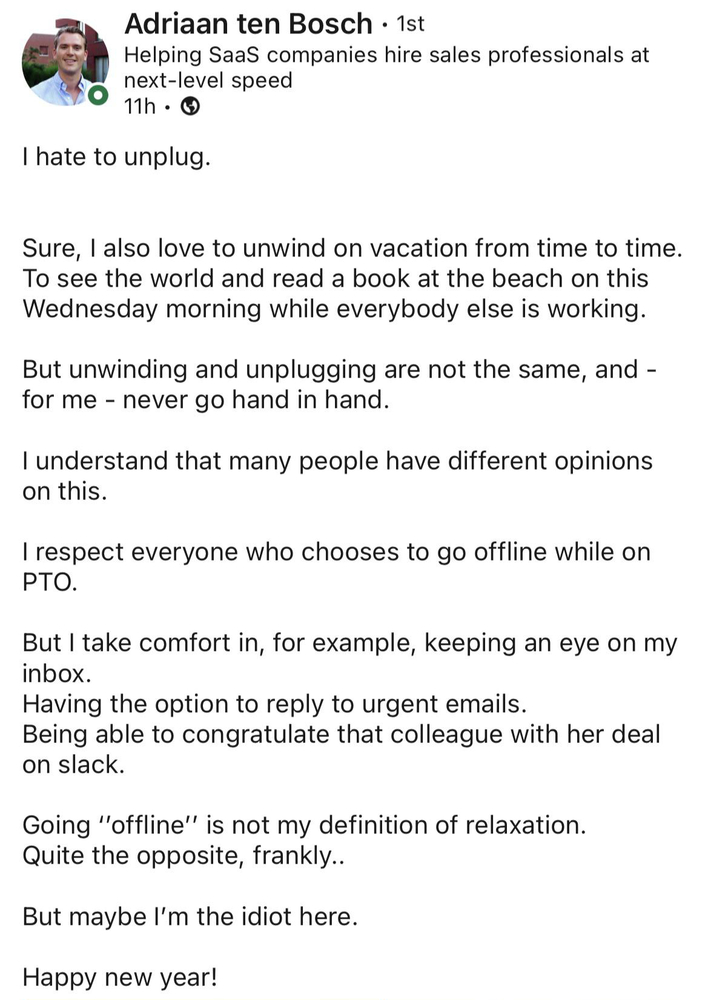Unplugging is good, actually
In the middle of 2021, a new word exploded through social media: “grindset.” The word may have been new, but the idea was not. Amid a continuing pandemic that upended our norms of work and life, the online world rallied around the notion that exceptionally hard work can transform a “side hustle” into a business.
Everything that was wrong about that idea back then is still wrong now, yet we continue to glorify “disruptors” and “innovators” and believe that the “Protestant work ethic” is the gateway to wealth. Although working hard and committing yourself to a purpose are noble and useful habits, don’t confuse raw, unmetered, self-destructive exertion with good leadership.
In a post on LinkedIn, this person “Andriaan” wrote:

These are the words of a person who has failed to create and maintain boundaries in his life. That’s harmful enough, but it’s only destroying his own blood pressure. His true error is one that many toxic leaders also make: he’s too present.
I don’t mean to undersell the pitfalls of overwork, here. If your idea of “unwinding” is being perpetually ready to reply to the next trivial email that comes through your inbox, you’ve bought a first-class, one-way ticket to Burnout City and when you get there you’re going to disappoint or betray everyone around you; the same people you claim to want to support and celebrate.
Lesson number one is as follows: your personal foundation, which is how you treat yourself, the habits and mindset that you use to make your work sustainable, and the way you care for your own physical body is the prerequisite to any lasting success in life, full stop.
You can probably ignore most of those things in your 20s, maybe even into your early 30s, but if you haven’t figured this stuff out by then, you’re going to be in for a rough ride. The ability to work long days, sleep little, exercise sporadically, and eat anything you want is a gift of youth. When you lose it—and everyone loses it—your capacity and vitality will hinge on the habits you’ve created.
But the real misdeed isn’t the way the “sigma male hustler” mortgages his health to deliver value to his shareholders. No, the leader who never unplugs is also hurting the team by neglecting the one thing they should be focusing most of their energy on: the environment.
An “environment in which success is inevitable” is my term for a self-sustaining organization that understands the broad intent to which they are committed, can recognize its own wins and losses, and continually adjusts its course based on observation. Creating that environment, as a leader of any kind, is impossible if you are an active player within it.
This is a common mistake that many leaders make, especially if they’ve risen through the ranks. So-called “front line” managers often need to be directly involved. You can’t be a tech lead or the manager of a small engineering squad without being hands-on, seeing the problems, sharing your experienced opinions, and so on.
But as you rise in seniority as a leader, as your “span of control” broadens, as you take on the management of other managers, your focus must shift away from the individuals and toward the systems, processes, and norms that support teams in creating their own successes. This can often happen on the scale of many months to many years, which makes it difficult to strike that ideal balance as it shifts gradually from one side of the spectrum to the other.
Lesson number two, then, is this: as a leader, your true success is measured by how the team performs when you’re not around.
If you have some knowledge, skill, or insight that is crucial to the team’s success on a day-to-day basis, you need to make it your top priority to share that with people on your teams immediately, starting this week. We like to think about team risk in terms of “What if so-and-so won the lottery and walked away tomorrow?” That analysis needs to include you.
It’s important that a team be able to function when someone is away. This is doubly true for you because it’s literally your sole responsibility to ensure that a team’s success doesn’t hinge on any single person. If it does, what is the point of having a team in the first place? If your job is “being the one person who’s really good at Postgres,” why are you a manager?
In short: unplug.
I’m giving you permission to say to your team, “I’m out this week, I’m not going to be checking anything, here’s my phone number, call me if something is turning upside down and you can’t handle it.”
Use your absence as a key experiment in how well you’ve structured the environment to support the team’s success. Do they understand how to mediate disagreements? Discover solutions to novel problems? Communicate their accomplishments and challenges to the appropriate parties? Reflect on how all of that is going for them on some regular basis? Do they celebrate what they’ve done well? Do they pivot when things are not going well?
Make it your job to make all of the above not your job.
When people look up to you—whether you are their direct manager, their “grandboss,” or their technical lead—you have more influence than you imagine. The way you show up, how you prioritize your own life, how you take care of yourself is scrutinized and emulated, whether consciously or subconsciously.
Being too present sends two harmful messages:
-
Your team can’t be trusted to figure things out for themselves.
-
Working more, even if not better, is what you care about.
Instead, put your energy into creating an environment in which, as Simon Sinek put it in “The Infinite Game,” “[your] people can work to their natural best.” When things aren’t going well, scrutinize the frameworks you’ve created. What mechanisms will make these challenges resolve themselves? If they don’t exist, create them.
Three questions for you:
-
How do you create space for yourself to unplug?
-
What iterative changes might you make in the environment that will help your teams become more self-adjusting?
-
What will you do this week to distribute more of the knowledge, skill, and awareness within your teams?
If you took something away from this, or put something into practice, I would love to hear about it. You can always write to me directly at aaron@aaronbieber.coach, or find me on Mastodon at @aaronbieber@indieweb.social.
Was this useful? Want more? You know what to do!
subscribeFeeling extra grateful? Buy me a coffee!
What would you create if you knew you couldn't fail? I help engineering leaders achieve their impossible dreams. Learn more here.

